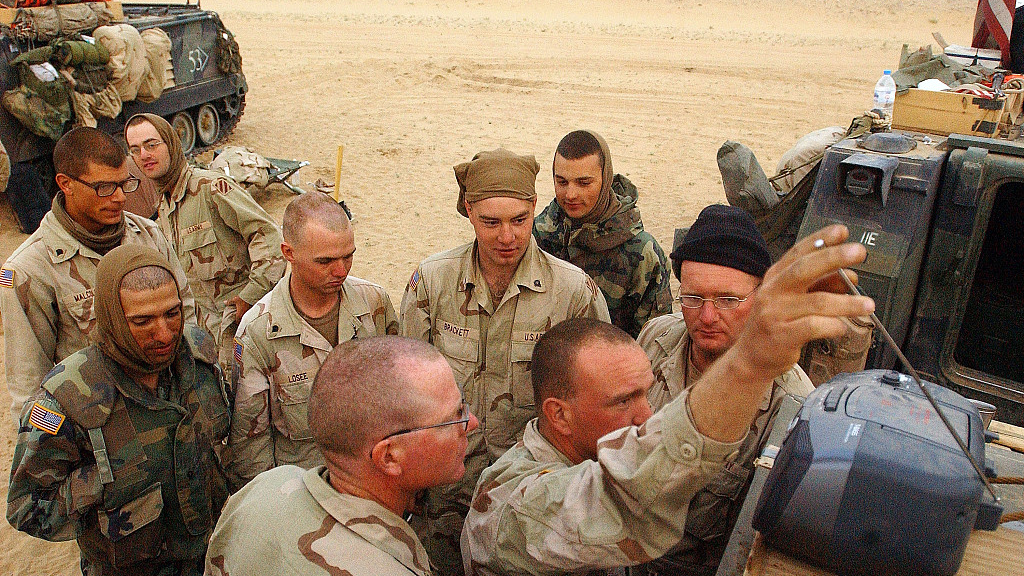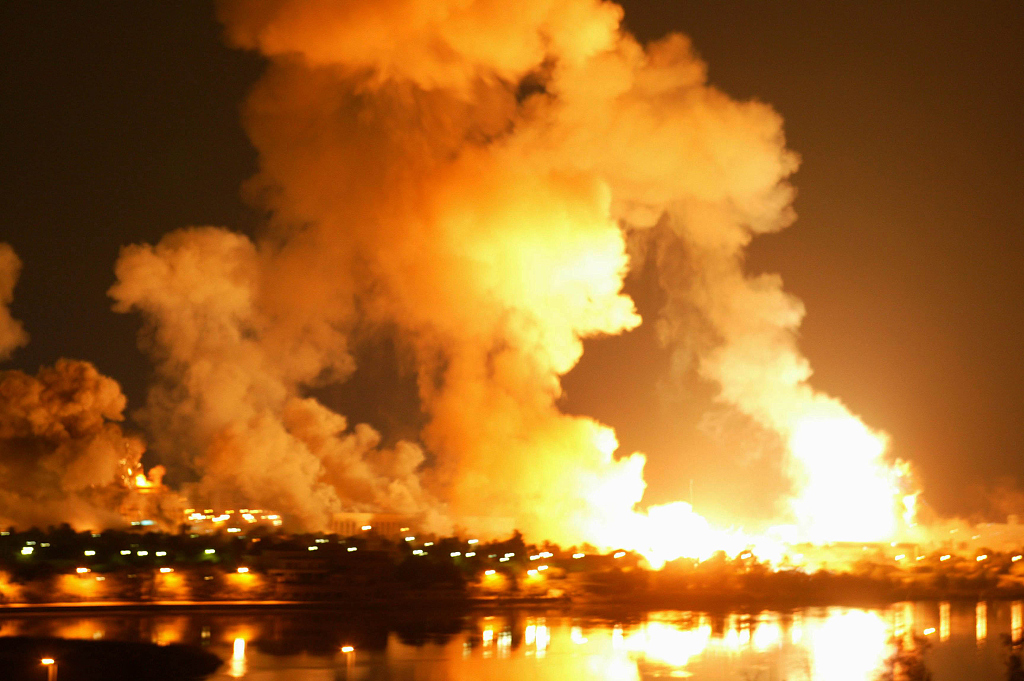
U.S. Army engineers on the Iraq-Kuwait border listen to former U.S. President George W. Bush's radio address to the nation, March 20, 2003. /CFP
U.S. Army engineers on the Iraq-Kuwait border listen to former U.S. President George W. Bush's radio address to the nation, March 20, 2003. /CFP
Editor's note: Wang Jin is a research fellow at Charhar Institute and the Northwest University of China. The article reflects the author's opinion and not necessarily the views of CGTN.
On March 20, 2003, the U.S. launched a war against Iraq and overthrew the Saddam Hussein regime with the excuse that it was eliminating weapons of mass destruction and terrorism. The U.S. invasion not only led to a large number of civilian deaths but also destroyed the political foundation and obliterated the power balance inside Iraq.
The U.S. invasion against Iraq came after the 9/11 attacks and Washington's "War on Terror." The most widely accepted story remains that the U.S. invasion against Iraq was motivated by the belief that Saddam Hussein had secret weapons of mass destruction program and had ties with terrorism networks. U.S. politician Condoleezza Rice's made remarks such as, "We don't want the smoking gun to be a mushroom cloud," and the U.S. Secretary of State Colin Powell presented a tiny vial of white powder to the UN Security Council as the evidence of Iraq weapons of mass destruction.
Although Powell's speech did not lead to the UN's approval of the U.S. invasion of Iraq, and neither Powell nor Rice made the final decision of military action against Saddam Hussein, the U.S. war on Iraq marked an important turning point for both the U.S. and Iraq.
The war in Iraq marked a decisive moment in undermining the U.S.' international credibility. Unlike the war against Iraq in 1991, the U.S. invasion of Iraq in 2003 started without the support of the UN Security Council, even without the support from its regional allies, such as Turkey and Saudi Arabia.
In 1991, with the support of a coalition of several countries, the U.S. launched the war against Iraq, and Washington's military victory was turned into political credit in the international arena. However, in 2003, although Washington's war against Iraq successfully overthrew the Saddam Hussein regime with a quick victory, the war started without UN authorization and suggested the decline of U.S. international credit.
For the Iraqi people, the U.S. war in 2003 started waves of turbulence that remain today. The U.S. went to Iraq with the ambition of not only overthrowing Saddam Hussein's regime and the Ba'ath party network in Iraq but also constructing a "democratic" system and turning Iraq into a political example in the Middle East. Nearly two decades later, the U.S. has withdrawn its military presence in Iraq and left a deadly legacy for the Iraqi people. The U.S. invasion destroyed the political foundation and left endless turmoil and unrest in the state.
It also destroyed the political balance in Iraq. As a state with competing for religious sects between Islamic Sunni and Shia, and ethnic divisions between Arab and Kurdish, Iraq now needs to find a way to bridge the gap between different religions and ethnic groups. Saddam Hussein's regime utilized Ba'athism and the slogan of pan-Arabism to unite Iraq. The U.S. war in 2003 expelled Ba'athism without constructing a new political structure. The division between Sunni and Shia became so rife that the extremist group, ISIS, was able to rise up from the Sunni-dominated western Iraq in 2014.

Explosions and Iraqi anti-aircraft fire light the sky during the third night of the U.S. shelling of Baghdad in March 2003. /CFP
Explosions and Iraqi anti-aircraft fire light the sky during the third night of the U.S. shelling of Baghdad in March 2003. /CFP
The ethnic ties between the Arab and Kurdish people have also worsened. The Kurdish Democratic Party from Kurdish Autonomous Region in Iraq called for national independence in 2017. Sectarian and ethnic politics dominate Iraq, while the nation's unity becomes weaker and bleaker.
The U.S. war also turned Iraq into a secondary state in the Middle East. Although severely weakened by the U.S.-led international forces attack in 1991, Iraq was still one of the most powerful states in the Middle East before 2003, especially in the Arab world.
In the Saddam Hussein era, Iraq played an important role in the Israel-Palestine peace process and influenced the Arab world with Ba'athism. After 2003, Iraq's strength became weaker in the Middle East.
National elections became an opportunity for external powers to influence Iraq's internal affairs, and major Iraqi political groups sought support from the U.S., Iran, Saudi Arabia and other external powers to compete for political power. The weak central government cannot meet the demands of its people, and social movements and protests further shake Iraq's national unity and capability.
The U.S. invasion and occupation also led to the death and suffering of many Iraqis. Compared to the 4,500 American deaths in Iraq after 2003, Iraqi people have suffered much more. Thousands of Iraqi civilians have been killed every year since 2003. Some Iraqi people died because of U.S. military strikes against civilian targets in various military missions. Others died in the unrest and turmoil that resulted from the U.S. war in 2003.
Mass protests have been ongoing in Iraq since autumn 2019. The Iraqi people are frustrated with the lack of electricity and clean water, poor infrastructure, high unemployment rate, political weakness and corruption and widespread poverty. The dismal prospects of Iraq's young people are also of great concern.
The U.S. war on Iraq in 2003, led by George W. Bush, drained both the U.S. and Iraq's national resources. The U.S. withdrawal from Iraq should not mean the end of the U.S.' responsibility in Iraq. Washington should do more to atone for the wrongs it committed since 2003.
(If you want to contribute and have specific expertise, please contact us at opinions@cgtn.com. Follow @thouse_opinions on Twitter to discover the latest commentaries on CGTN Opinion Section.)

